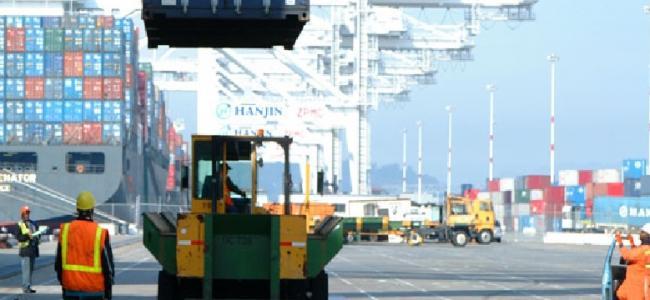Longshoremen Attack!

Union Squeezes U.S. Ports for Holiday Season
On Friday October 31, 2014, it appeared as though the International Longshore and Warehouse Union (ILWU) began organizing worker slowdowns along the West Coast-home to ports that allow more than half of all freight to enter and exit the United States. These worker slowages started in Tacoma, spread to Seattle that weekend, and have recently began in Los Angeles and Long Beach.
Retailers and manufactures estimate that such slowages could cost the national economy upwards of 2 billion dollars per day, similarly to the slowages of 2002. The National Retailers Foundation (NFR) Senior Director of Media Relations Stephen Schatz elaborated:
“The West Coast ports just aren’t about retail, but about every sector involved in importing and exporting, like autos and agriculture…Nationally it impacts everyone involved in international trade.”
What motive could the ILWU possibly have for putting American businesses in such jeopardy?
On July 1, 2014, a six-year contract between the ILWU, which represents about 20,000 part-time and full-time West Coast dockworkers, and the Pacific Maritime Association expired. The Pacific Maritime Association (PMA) serves as the administrator and negotiator for maritime shippers in labor agreements with the ILWU.
Despite months of negotiations over issues such as healthcare plans and jurisdiction, the union and PMA have yet to arrive at a new contract agreement. According to PMA Spokesman Wade Gates, both parties did agree, however, to operate under normal working conditions until new arrangements could be made. Unfortunately, Gates notes in a PMA press release, “Now the ILWU has reneged on that agreement.”
“It is extremely difficult to have meaningful negotiations under the current conditions in which the ILWU is deliberately slowing productivity in order to pressure our member companies. We urge the ILWU to rethink their slowdown strategy, which has the potential to cause great damage to the local, regional and national economies. It is essential that we resolve our differences at the negotiating table, rather than on the job site.”
The ILWU slowdown is leaving about 50 percent of yard crane positions vacant; West Coast terminal productivity has fallen between 40-60 percent. One California-based freight forwarder is expressed dismay in the American Journal of Transportation (AJOT): “It’s appalling when a small group of people like the ILWU can hold the US economy hostage by deciding not to work.”
It seems as though these slowages are the ILWU’s strategic way blockading the American economy to win their war against the PMA. How could some of the most well paid blue-collar workers be selfish enough to take crippling actions on businesses during prime earning holiday months? An ocean carrier executive comments on the potential devastation in the same AJOT article:
“I can’t understand how longshoremen on the West Coast can be so out of touch with workers in the rest of the country who aren’t in a position to take such risks with their jobs and their livelihoods. These disruptions are causing dislocations with shippers and retailers all over the US, and as Christmas time approaches, those impacts directly affect workers at stores and warehouses who depend on Christmas as part of their livelihood. Maybe it’s time the ILWU woke up to how it’s impacting other workers”
The union is denying these allegations by blaming the slowages on non-labor related port issues, but there is no question that the union wants more from the PMA even though most longshoreman already make about $123,000 and receive benefits worth about $93,000 each year.
At least the longshoreman will have a nice Christmas.





